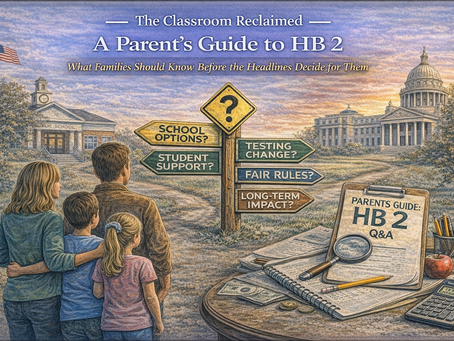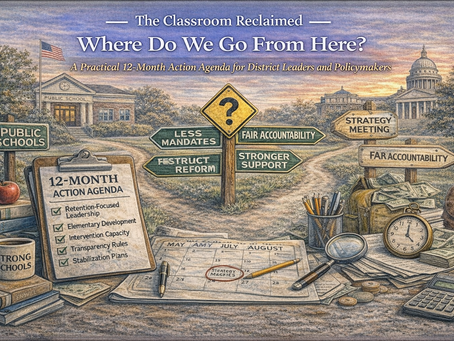top of page
Search
All Posts


What Accountability Should Look Like Without More Testing
Growth, Support, and Trust—Not More Screens and Scorecards If Mississippi truly wants less testing—especially in the elementary grades—then we need to answer a question that policymakers and the public often skip: How do we measure whether schools are improving without piling on more tests? The answer is not “no accountability.”The answer is better accountability —the kind that helps schools improve, keeps parents informed, and protects instruction time. This post lays out a
Al Felder
30 minutes ago4 min read


A Parent’s Guide to HB 2
What Families Should Know Before the Headlines Decide for Them HB 2 has produced a lot of heat—social media posts, soundbites, political speeches, and strong emotions on all sides. But families don’t live in soundbites. Families live in the daily reality of school: “Is my child safe?” “Is my child learning?” “Do I trust this school?” “What happens if my child struggles?” “Will this decision help or hurt our future?” This post is written for parents who want clarity without...
Al Felder
35 minutes ago4 min read


Where Do We Go From Here?
A Practical 12-Month Action Agenda for District Leaders and Policymakers It’s easy to write about education policy. It’s harder to run schools while policy shifts in real time. HB0002IN has sparked big questions about accountability, choice, testing, staffing, reporting, funding stability, and fairness. Regardless of where someone stands on the bill, most people agree on two things: Students deserve strong schools. Public education is carrying too much load. So here’s the que
Al Felder
40 minutes ago4 min read


A Fair Accountability Compact
What Rules Should Apply to Every Publicly Funded School Option? After everything we’ve covered in this series—testing burden, screening expansion, staffing flexibility, reporting load, funding pressure, and public schools’ universal-service obligation—we arrive at the most important policy question of all: If public dollars fund education, what baseline rules should apply to everyone? That question is not anti-choice. It is pro-fairness. It is also pro-parent, pro-student, an
Al Felder
Feb 144 min read
bottom of page
